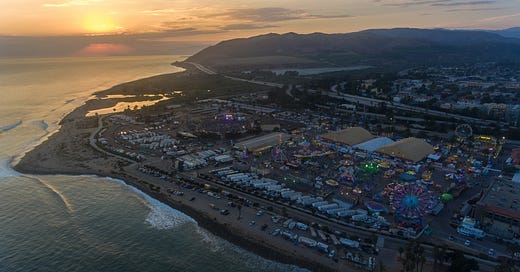SET 1: NICU > Wolfman's Brother > Chalk Dust Torture, Water in the Sky, Stash, Weigh > Piper > Cars Trucks Buses, Character Zero
SET 2: Punch You in the Eye > Free > David Bowie -> Cities -> David Bowie, Bouncing Around the Room, Uncle Pen, Prince Caspian > Fire
ENCORE: My Soul
I’m ready to call it: David Bowie was one of the all-star Phish songs of Summer 1997. Maybe this is not breaking news, but I consider myself a pretty obsessive Phish fan (ya think?), and this honor was not obvious to me before this summer’s listening. When I think of Summer ‘97, I think of Ghost and the other new songs, Wolfman’s for its pivotal role in the Phish transformation, or Taste, the best Type I articulation of the band’s blooming four-way dynamic. Bowie is counter-trend to this group of cool kids – it’s old, it’s not funky, and it’s definitely not minimalist.
Yet after a down year for the song, with only two fairly unmemorable jam chart versions for all of 1996, Bowie is dropping consistent bangers this whole summer. From the opening weekend version in Dublin through the second encore at Paradiso night 2, it was the rare example of an older epic that survived the band’s songlist purge and still thrived. Back in the U.S.A., it held its own amidst the gaggle of American debuts in Virginia Beach and spaced out with Gullotti on second drums in Austin. Now here’s the Ventura version, a half-hour Cities sandwich that likely clinched the inclusion of this show in that 2013 box set.
In a funny way, these hefty Bowies might have been one of the most crowd-friendly moves Phish was willing to make in 1997. Many of Bowie’s counterparts on Junta – Foam, Golgi, Fluffhead, Fee – have been put into the crawlspace. Many of the traditional jam vehicles – Tweezer, Mike’s, Melt, Reba – that Bowie used to rotate turns with through much of the early 90s are also much more scarce than usual. Any song with the classic Phish formula of “fussy composition > jam section” has never been and never will be more unfashionable and out of favor with the band. And yet Bowie remained a steady presence, reliably showing up every 3-7 shows – more infrequently than usual, but without the startling 20/30/40-show gaps of other songs in this paragraph*.
In addition to being a lonely representative of Phish’s songwriting past, Bowie also brings some older, more familiar jamming styles into 1997. The advent of cowfunk helped usher in more patient, theme-based improvisation – think the 7/23 Ghost, where the 26 minutes are neatly split into three chapters of funk, a big rock blow-off top, and a sinister low-key coda. Each section finds a sound, a chord progression, or a melodic theme and spends several minutes meticulously dissecting it, with no urgency to jump to a new idea.
Bowie’s most recent peak is the opposite, a standard-bearer for the big, complex jams of late 1994 and summer 1995 that were stuffed to the gills with twists and turns. The song is no stranger to the 20-30 minute zone, but gets there by elongating its atmospheric hi-hat intro, then taking its open middle section on a multi-stop journey; think 11/26/94, 12/29/94, or 6/29/95. These jams are much more episodic (in Fall 1994) or dissonant (in Summer 1995) than what you’re likely to find in 1997, where even the longest jams have a smooth narrative arc.
Bowie survives the youth-oriented rebuild of 1997 by meeting it halfway, as the Ventura version demonstrates. There’s still a dark, long intro – 4-1/2 minutes tonight, with the rare non-humorous vacuum accompaniment – but that provides space for Trey’s experiments with loops and the band’s early dalliance with ambient textures (the hi-hat doesn’t even appear for nearly 3 minutes). The jam briefly hints at the fickle days of yore with a detour into ska, but it’s quickly discarded and steered back to Bowie as usual, like, pre-1994 usual. But it can only stay in the past for so long, and the 1997 sound comes barging in at minute 18.
It sounds like the wah-and-clavinet-and-prominent-Mike recipe will get engulfed by the Bowie gloom, but instead the old song yields to the new trends, flirting with Manteca and then diving into the first performance of Cities on U.S. soil since 1989. It’s a strangely manic take, played in the wrong key and ten times faster than the sludgy European versions, a compromise between the past and the present. And the decision to drop back into Bowie – very seamlessly – is another old-school move at a time when Phish was just fine with leaving songs unfinished.
Earlier this year, I hypothesized that Phish was struggling to push its sound forward within the constraints and habits of older songs, an argument in favor of the 1997 mass shelving. In bucking this trend, Bowie opened the door for other songs from its earlier generation to return, a reversal that will begin in just a couple shows. Yet mysteriously, Bowie itself would also only appear once more this summer (a perverse and excellent version at Deer Creek), and wouldn’t get its name called in any of the six sets at The Great Went. After that, it will take a back seat again in the fall tour, overshadowed by other songs maturing and metamorphosing, its summer role as the veteran bridge between old Phish and new no longer necessary. David Bowie – thank you for your service.
*- in fact, Bowie only had one double-digit show gap between 1990 and 2000, a 10-date vacation in 1992. Its longest gap remains the 49 shows (that we know about) Phish played before its debut in 1986.





